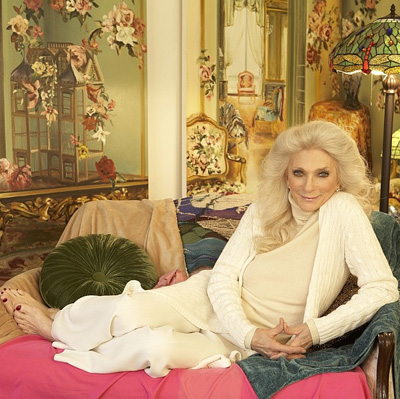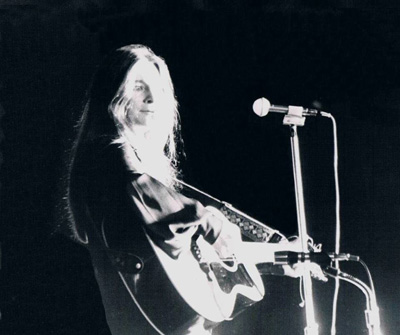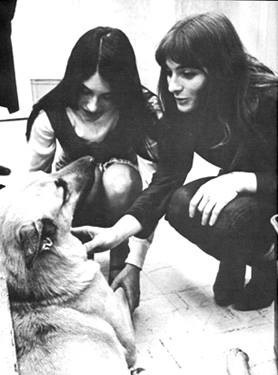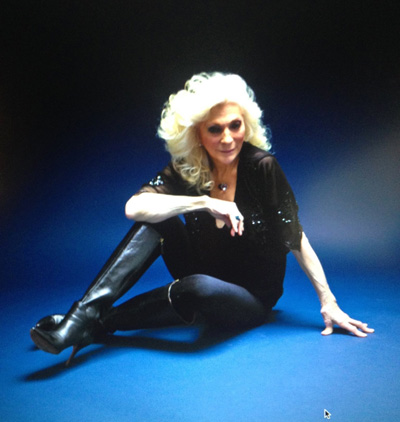Judy Collins Performing at MIM in April
An Interview with Judy Collins
By Mariah Fleming

Judy Collins, whose award winning music captured the hearts of millions in the 1960's, is returning to MIM for two shows on Thursday April 16 and Saturday April 18 at 7:30. The music of Judy Collins continues to enchant and inspire new generations of fans. Her exceptional talent has yielded an extraordinary life. Along the way, she has garnered gold and platinum selling albums as well as top ten hits. Her rendition of Joni Mitchell's "Both Sides Now" is in the Grammy Hall of Fame. The song, from her landmark 1967 album "Wildflowers," sent her career into the stratosphere. Her captivating version of "Send in the Clowns" from the Stephen Sondheim play "A Little Night Music" won a Grammy for Song of the Year. Collins herself possesses a masterly skill for songwriting. In a delightful conversation last week, we talked about a myriad of subjects including her childhood as a piano prodigy, her roots in Greenwich Village, her relationship with artists like Leonard Cohen and Richard Farina and her thoughts about the world she grew up in versus the world we live in now. My conversation with Judy Collins follows.
Q. You've appeared at MIM before, and it's great that you're going to perform at MIM again. Is there something special about the MIM that brings you back?
A. Yes. We love it there, that's a very special place. The sound quality is very fine. I'm very happy I'm going to be there again.
Q.You do a lot of dates each year. How is it for you to tour after all these years?
A. I love it. I hope I’m getting better at it.
Q.You've been performing since the early sixties, which is extraordinary.
A. Well, you know, that's what a working artist does…to continue doing what we do. And I feel very fortunate and blessed to be able to do it. It's come with a lot of training. I've learned to do a lot of things. I've had a fantastic career and it just goes on and on, which is wonderful.
Q.Does it invigorate you to tour and perform live?
A. Oh yes, it does. I make a living, I get invigorated, I have fun, and I love my audiences. I enjoy every minute.
Q.You've been married now for 30 years or so. I imagine it can get kind of lonely being on the road. Does your husband ever come on tour with you?
A. No, no he doesn’t. I hope that he doesn't ever have to (laughs) but he will always come if I’m in New York or if it's a special sort of thing. Or when I have a little time, he might come out, but no, not regularly. He has his own life, thank God.
Q.I’m interested in your early life and your family. Let's talk a little about that.
A.
Sure.
Q.You were really close with your dad. Was your whole family musical or was your dad the only person other than yourself who was musical?
A. They were all musical but none of them make a living at it. So, he was the inspiration.
Q.Your dad was a musician, and he also did other things. Can you tell me about that?
A. Oh yes, he was a singer and an entertainer. He had a career in the radio business for thirty years and made a living doing it. He put us all in shoes and fed us. He was a great provider.
Q.I saw an interview in which you talked about your dad's radio show. You said that you were kind of surprised that it remained on the air. Why was that?
A. Well, my father was very outspoken. At the time, people like John Henry Faulk [folklorist, humorist, civil rights activist] were talking about [Sen. Joseph] McCarthy [House Un-American Activities Committee] and Faulk got knocked off the air. So, I think people adored my father and put up with him, and sort of took him with a grain of salt. But my father certainly helped to radicalize Denver at that point.
Q.So the roots of your activism run deep?
A. Yes. In my family, we had always been raised to take part, to have an active role in our society, in our culture. We were urged to take action when we thought it would be helpful, and to raise our voices when we thought they should be heard.

Q.Do you have brothers and sisters?
A. Yes. I am the oldest of five, three brothers and a sister.
Q.You took an active role in telling the world about history's first woman symphony conductor, Antonia Brico, who was your piano teacher. Your 1974 documentary "ANTONIA" was critically acclaimed as a breakthrough in feminist filmmaking. Brico certainly was an amazing and very determined woman.
A. You're right, she was. She conducted Sibelius' orchestra in Europe and she studied Swedish in order to do that.
Q.When you approached her about doing the movie, did she want to do it?
A. She said, "Oh yeah, sure, everybody's always saying they want to do that and nobody ever does it!" (laughs) so I said, "Well, we'll be there with our cameras!" and she was there. And we had a fantastic time! It has been 40 years since I produced the movie and co directed it with my friend Jill Godmilow. So it's going to be on PBS again this year.
Q.That's wonderful. It needs to be shown again.
A. Yeah, I think it does!
Q.Did Brico ever make peace with the fact that her brilliant child prodigy, Judy Collins, chose not to pursue classical music and instead decided to do folk music?
A. Oh, I don't know that she ever made peace with it. I think she always was very unhappy about it, but, well, you know, that's life. (laughs)
Q.Did she come and hear you play?
A. Yes. Yes, she did!
Q.Did the two of you remain close throughout your lives?
A. Yes. We were very close. She never did 'get it' (laughs) but that's OK! She didn't have to!
Q.Do you still play classical music?
A. Oh, of course. I do, and I always practice. That's what keeps me centered, I think.
Q.When you were a little girl, when did your parents realize you were a prodigy? Did you just gravitate towards a piano that was in your house or what?
A. Sure, that's exactly what happened. My dad knew what was going on from the beginning. He was very smart. My dad was on the road sometimes, and I would get trotted out on the stage to perform.
Q.So you toured with your dad?
A. Well, when I was 3 and 4 years old my mother would be driving when my father was on the road. He would take off a season and do concerts in the northwest and then get back to his radio show. So yeah, we had a sort of "touring circus" like existence in some ways.
Q.You were active in the civil rights movement in the south and in many other causes. Do you worry that the surveillance that's going in the US might be hampering the expression of dissent in terms of peaceful demonstrations and in the political content of the arts?
A. Of course it is! Of course it is! That's what the government does. They keep looking. Sometimes we get a peaceful demonstration, but you know you have to be aware that everybody's watching. It's not just big brother, it's big sister and NSA and everybody else. We don't have to kid ourselves. Everybody knows what's going on. (laughs)
Q.Yeah, it certainly seems like they should. During the 1960's, your generation stopped the Viet Nam war and created positive change in other ways. But in the decades that followed, we saw little on that scale of activism. And since 2001 things have really tamped down.
A. Well, this is an interesting time. It's a different time. People are very active, I think. It's not the way that it was; it's not a scenario that we would recognize as our scenario, but there's a lot of activity.
Q.So you feel pretty optimistic?
A. Well, you know, a couple of years before Pete Seeger's death, I asked him, "How are you feeling about the world?" and he said, "I have never been so hopeful!" I asked him why and he said because so many people are doing so many things all over the country, all over the world, in little pockets and in big groups.
Q.Do you think it has to do with the ways in which people can make themselves heard now?
A. Yes, we have a different approach now, because the Internet gives us a lot of access to things that we probably wouldn't have had any access to before.
Q.You were involved in so many causes when you were younger, as were many of your peers. Are you still involved?
A. I still get involved with an awful lot of things like Act Blue and other things online. I can make a difference. I can sign a petition. I don't have to march necessarily. Not that we shouldn't and not that people don't, but that's not the only access. Whereas, in those days, I think it fundamentally was the only way. I mean, you could write to your congressmen all you wanted but you could also get out on the streets in a way that we don't necessarily do now. But we do other things.
Q.In 2002 you participated in a national town hall meeting to assess the state of mental health of America. Thirteen years after that, do you think America's mental health is better of worse?
A. I can't speak to that. I'm not going to talk about politics. But I can say that I am hopeful. I think there are strong things going on every where, that I have a candidate that I can work for, and as much as the system is flawed, there are times that it works.
Q.I just interviewed Janis Ian last month and she said she knew she was under surveillance after she became a performer. Was that your experience back then too?
A. Oh, yeah, everybody was, none of us were off the hook. [After the Freedom of Information Act] I got my freedom of information pages. Of course they were redacted (laughs) and most of it was blacked out but you got the idea.
Q.Let's get back to your music. In the 1960's in Greenwich Village you helped bring visibility to artists like Joni Mitchell, Randy Newman and Leonard Cohen. Leonard Cohen is one of my favorite poets and artists, and I can think of at least ten Leonard Cohen songs you've recorded over the years.
A. Oh, yes…
Q.How did you meet Leonard Cohen?
A. A mutual friend had introduced us. Leonard had been writing poetry, publishing novels and living in the islands, Ibiza I think, the Greek islands, and then he came to see me.
Q.Tell me about that.
A. He called me up and said, "Can I stop by? I have some songs to play for you." And he played me "Suzanne", "Dress Rehearsal Rag" and "The Stranger Song" and I recorded them. Then, as you say, I recorded a lot of his songs. And that got him sort of into the world and got him a record label because then people knew who he was.
Q.I've read that he is now a Buddhist Monk, is that correct?
A. Oh, he's always been a Buddhist Monk. Forever.
Q.He's always seemed to be introverted. What is he like as a person?
A. He's a wonderful man. He's a wonderful writer. I think his recent album "Personal Problems" is the best thing he's done. He is just amazing. It's a wonderful piece of work.
Q.Speaking of wonderful work, many of your songs give me goose bumps.
A. Oh, thank you!
Q.But you waited quite awhile to begin writing your own songs, didn't you?
A. Well, yes. That's true.
Q.I've read that "Since You've Asked" took you twenty minutes to write and it was the first song you ever wrote. Is that right?
A. Yes. But the reason I wrote that song was all due to Leonard. After I'd recorded all those songs of his, he called me one day and said "You know, I like what's going on, I’m very happy that you're recording my songs, but why aren't you writing any of your own songs?" So I went home and started noodling at my piano, and that's what came out. Leonard Cohen is the reason I started writing songs.
Q.Your songwriting is stunning. I'm thinking of songs like "My Father," "Albatross" "Since You've Asked" and so many other songs that I've listened to and played over the years. They're exceptional.
A. Oh, that's very nice. Thank you.
Q.One of my favorites is "My Father." I've always thought that "My Father" was autobiographical about your dad but given your history, I mean, obviously you didn't grow up in Ohio…
A. Well, we call it artistic license. If it doesn't rhyme you have to make it rhyme, (chuckles) that's the challenge. The feelings are what it's about rather than the specifics.
Q.I assume your parents are not here anymore?
A. No, they're not here anymore, sadly.
Q.Did your father get to hear that song?
A. No. I wrote it three weeks before his death and he never heard it. But I figure he's with me somewhere all the time…
Q.Did your mom hear it?
A. Oh yes, many times. Probably many more times than she would have preferred! (laughs)

Q.I want to talk to you about your relationship with Richard and Mimi Farina, whose music together was cut so terribly short.
A. Oh, yeah…it was very sad
Q.In 1965, Richard and Mimi Farina released two albums, "Celebrations for a Gray Day," and "Reflections in a Crystal Wind." You recorded Farina's "Hard Lovin' Loser" for your 1966 album "In My Life" and then in 1966, Richard Farina died in a motorcycle accident. Did I get the chronology right?
A. Yes. We had just recorded "Hard Lovin' Loser" in, I think, March of 1966 and he died in May. What a shock. He was a very close friend. I just posted a picture of Mimi at that session on my Facebook page.
Q.Farina fascinates me. I was the weirdo kid who was listening to Richard and Mimi Farina and you while my friends were only listening to top 40. And I’m wondering, how long did you know Richard Farina?
A. I knew him from about 1959 or '60, so about five or six years. Richard was a very, very close friend. I guess I might have been closer to him than almost any other male singer in that era…maybe Tom Paxton. But Richard and I were very, very intensely close and friendly.
Q.He certainly had a unique and tremendous gift for songwriting. And of course, there was his book "Been Down So Long it Looks Like Up to Me."
A. Yeah. Richard and I were always talking about writing our books and writing our songs, and I hadn't yet written any songs. After his death I used to dream about him so I could tell him that I had finally written songs. (laughs)
Q.Did you meet him in the Greenwich Village music scene or what?
A. Well, yeah, he was there. But he was in California sometimes. He got around a lot. I met him first, I think, when he was married to Carolyn Hester, at a festival in Connecticut in the rain in 1960. He was married to Carolyn and then they quickly got a divorce and he married Mimi.
Q.I assume you knew Mimi until her untimely death?
A. Yes, she was a tremendously close friend of mine. She died of lung cancer. She never smoked, you know; you hear that a lot.
Q.I've heard so much about Greenwich Village and the many great clubs there where artists had a chance to be heard, like The Village Gate, The Bitter End and The Gaslight. You were discovered at The Gaslight in 1961, right?
A. No, the first club I worked at was Gerdes Folk City. I didn't ever work at The Gaslight. I worked at The Bitter End a lot. But Gerdes is where I really kind of landed and established a beachhead in the NY folk community. So I was very much a part of that community.
Q.That’s interesting because numerous sources I found said you were discovered at The Gaslight by the president of Elektra Records. And that's not true at all.
A. No, no, (laughs) they also say I was a busker, which I never did. I've always been paid for what I did. Never enough (laughs) but I've always been paid.
Q.You signed with Elektra in the early 60's, is that right?
A. I signed with Elektra in April of 1961, the same month that I came to New York and worked at Gerdes Folk City.
Q.So how did Elektra find you?
A. Jac Holzman [founder and CEO of Elektra Records] found me. He came to see me. I was doing a television show at The Village Gate. Jac came to find me after I did the show. And he had actually been to see me in Colorado two years before.
Q.How did that come about?
A. It was because [folksinger] Bob Gibson, who originally discovered Joan Baez and took her to Albert Grossman and hooked her up with Columbia, was working with me in Denver in 1959. Bob had made a number of records for Jac Holzman. And Bob called Jac up and said, "There's this girl down here in Colorado and she's great."
Q.So Jac Holzman came to Colorado to see you and signed you there?
A. No. Jac came out to see me in Denver and he passed on me! He said, "She's not ready" (laughs) and until not long ago, I didn't even know this! So anyway, when Jac came to see me two years later at The Village Gate, he stuck out his hand and said, "Dear, you're ready to make a record!" And that's how that happened. And we're still close friends.
Q.Now you have your own label, Wildflower Records, which you began not just for your music but to help other musicians get heard, is that right?
A. Yes, we have some other artists on the label.
Q.I have the compilation on which artists like Shawn Colvin and Dar Williams do a tribute to your music.
A. Oh, yes, that was so wonderful. It was so kind of them to do that for me. I like it a lot.

Q.These days, where can musicians go to perform their original material and hone their craft? Clubs like The Village Gate, The Bitter End and the rest, pretty much everywhere, are all gone. And there was an important sense of community built around those clubs in Greenwich Village that doesn’t exist anymore, unless my impression is wrong.
A. Oh, no, you're right. It's different now. There are lots of clubs across the country and people are working, but you have to search them out to find them.
Q.You've done beautiful covers of many songs. You did the penultimate version of Joni Mitchell's "Both Sides Now." Did you meet Mitchell before you did her song?
A. No, I didn't know her before that. She was introduced to me by a friend, Al Cooper, on the telephone at 3 o'clock in the morning. He had picked her up at a club and followed her home because she said she wrote songs. When he heard the song he called me and put her on the phone and she sang it to me.
Q.This is when Joni Mitchell was basically unknown, right?
A. Yeah, she was hanging around the Village trying to get jobs. She had her one song that everybody seemed to know called "The Circle Game." Tom Rush was the person who originally recorded that.
Q.Yeah, he does a beautiful version of that
A. Yes, he sure does. I love him. He's wonderful.
Q.Are you still in touch with people like Joan Baez, Joni Mitchell and Tom Rush?
A. Oh, yes, Joni and I, Joan Baez I mean, are very close. I don't see much of Ms. Mitchell. Sometimes I see more people more of the time. Sometimes there are lots of festivals. Sometimes months go by, years go by, and then suddenly you see people all the time. It comes and goes.
March 22, 2015
Contact the author of this article at Editor@MusicAndMoreAZ.com.